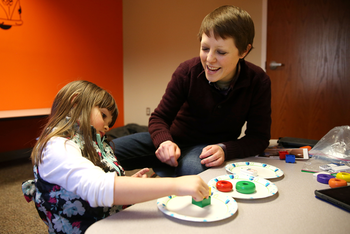"When you have exhausted all possibilities, remember this: you haven't"
- Thomas Edison
Comprehensive ABA Therapy
|
Comprehensive ABA looks at producing changes across global areas of functioning including cognitive, adaptive, social, and emotional domains.
Programming is typically 20-35 hours/week of direct treatment with parent education. Comprehensive ABA intervention ranges from highly structured lessons to a more naturalistic programming that can look like play, chore completion or simple conversation. Comprehensive ABA is recommended for children who have just recently received the diagnosis and children generally between the ages of 0-7 years of age. |
Focused ABA TherapyFocused ABA services are appropriate for individuals who (a) need treatment only for a limited number of key functional skills, or (b) have such an acute problem behavior that it's treatment should be the priority. Focused ABA usually ranges between 10-20 hours/week of direct treatment.
Examples of key functional skills include; establishing instruction-following, social communication skills, compliance with medical and dental procedures, sleep, hygiene, self-care skills, safety skills, and independent leisure skills (for example, appropriate participation in family and community activities). Examples of acute problem behaviors requiring focused intervention include; self-injury, aggression, threats, pica, elopement, feeding disorders, stereotypic motor or vocal behavior, property destruction, noncompliance and disruptive behavior, or dysfunctional social behavior. |
Intensive Toilet TrainingOur evidence-based Toilet Training Program typically consists of: Helping your child with regular trips to the bathroom, giving positive reinforcement for using the bathroom appropriately and teaching your child to ask to use the bathroom.
Caregivers will be involved every step of the way to develop at-home support strategies. Most families will start with consultation service and receive personalized care from there. |
Social Skills ProgramOne of the most prevalent challenges for individuals with Autism Spectrum Disorder and related disorders is in the area of social skills. This includes difficulty with observational skills, eye contact, play interactions, social pragmatics, taking another’s perspective, making inferences, sharing enjoyment and building relationships.
The assessment and intervention “matching” process is different from a one-size-fits all approach that involves generic behavioral interventions for unique and individual behavioral excesses and deficits. We believe that achievement in the domain of social interaction greatly improves the quality of life for a learner and we place a premium on screening, assessment, and individually tailored interventions. |
Professional TrainingBAIC offers professional training to individuals interested in becoming an RBT (Registered Behavior Technician) and provides supervision hours to professionals accruing hours for the BCaBA and BCBA board examinations.
|







